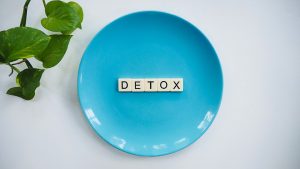 Whether you’re worried about all the toxins you consumed over the holidays, considering all the processed food you ate or just want to rid your body of that bloated feeling, a detox might be in order. However, you also need to make sure that what you’re detoxing with is also a healthy option, unlike the lemonade or cabbage soup detox, you can cleanse your system and get healthier in the process. Always check with your health care professional first to ensure it won’t interfere with medication or exacerbate existing health issues.
Whether you’re worried about all the toxins you consumed over the holidays, considering all the processed food you ate or just want to rid your body of that bloated feeling, a detox might be in order. However, you also need to make sure that what you’re detoxing with is also a healthy option, unlike the lemonade or cabbage soup detox, you can cleanse your system and get healthier in the process. Always check with your health care professional first to ensure it won’t interfere with medication or exacerbate existing health issues.
A detox may start with a fast, intermittent fasting or a liquid diet for a few days.
While some detox diets start with excluding all calories for a few days and sipping on water or tea, most start with a low calorie liquid diet and intermittent fasting. Intermittent fasting can be anything from skipping eating for a day to eating all meals in an eight hour time frame with the balance of the day, 16 hours, without eating. There’s been a lot of animal studies on intermittent fasting and it’s been found to keep rats younger looking and healthier. The first day or two is often devoted to the cleansing portion of a detox.
What else is part of a detox?
Often people give up caffeine and eliminate alcohol and nicotine as part of the detox restrictions. After the initial cleansing phase, often meat is restricted and bland foods, such as brown rice, is part of the detox diet. Sugar is never part of a detox diet, neither is processed food. Some people include herbal teas to stimulate the colon or a colon cleanse, while others include foods with beneficial bacteria to repopulate the friendly bacteria in the system.
Detox diets contain a lot of fiber.
Brown rice, fresh steamed vegetables, fruit and broth are introduced into the diet after the cleansing phase, which normally lasts a couple of days. Foods that aren’t included in this phase are meat, sugar, eggs, wheat and processed foods. In fact, in many cases, people opt to restrict the intake of sugar, wheat and processed food indefinitely.
- Detox diets, particularly those that involve intermittent fasting, can prove beneficial according to many studies. While the increased consumption of liquids help remove water soluble chemicals, it doesn’t help remove fat soluble ones, which is the most frequent kind. Only weight loss can do that.
- The raw vegetables in the detox diet can help remove toxins from the liver via their fiber, which also adds bulk to the stool and keep the body elimination system running smoothly.
- You should consume water frequently on a detox diet, which is a healthy option even when you’re not detoxing. The use of laxative teas and colonics are not recommended. Neither are longer detox diets.
- The healthiest detox diet is one that includes increasing hydration, a higher consumption of fresh fruits and vegetables and low in alcohol, caffeine, sugar and processed foods.
For more information, contact us today at Next Level Fitness
